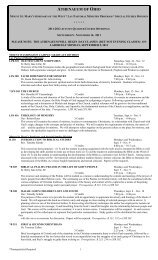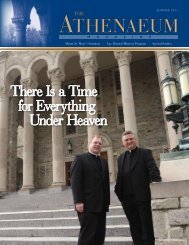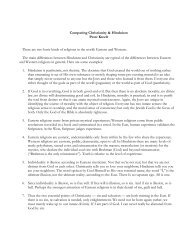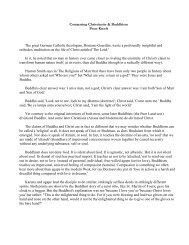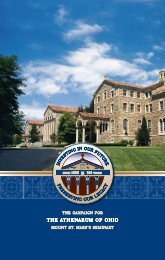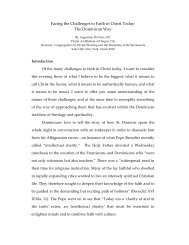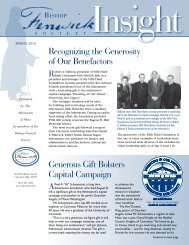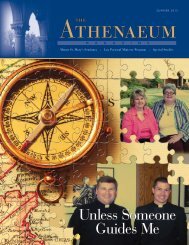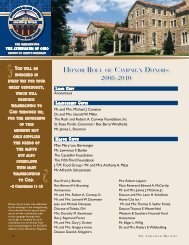Notes from Gathered for the Journey Six (6) essays David McCarthy
Notes from Gathered for the Journey Six (6) essays David McCarthy
Notes from Gathered for the Journey Six (6) essays David McCarthy
Create successful ePaper yourself
Turn your PDF publications into a flip-book with our unique Google optimized e-Paper software.
I. Why Natural Lawpp. 154 – 158Three Major Convictions about <strong>the</strong> WorldNatural law reasoning follows <strong>the</strong> impulse by ―confidence in <strong>the</strong>se three basicconvictions:‖1. The world has a certain order to it2. Human beings can recognize <strong>the</strong> ordering of <strong>the</strong> world3. The order of <strong>the</strong> world is a good thing and should be maintained. (154)So, human nature matters when we‘re thinking of human actions.Open to all thinking persons—regardless of faith beliefsBottom line: ―Natural law, at its most basic level, is <strong>the</strong> impulse to give anaccount of <strong>the</strong> world and our place in it, and <strong>the</strong> belief that such an account willindicate <strong>the</strong> sorts of actions that might or might not lead to our flourishing.‖ (154)(Note: such a system of reasoning calls into question any assertion of a ―raw autonomy,‖or unbridled choice of <strong>the</strong> individual—freedom has its guideposts in <strong>the</strong> ―order of things,‖and reason can engage this inquiry. Cf. <strong>the</strong> Garden of Eden—failure to engage <strong>the</strong> moral―order of things‖)For a Christian, God is <strong>the</strong> source of this order (cf. Joseph Grcic‘s definition in <strong>the</strong> classnotes).Creation and God’s Plan <strong>for</strong> Our Good and our SalvationChristian scriptures reaffirm and deepen <strong>the</strong> sense that ―Nature is not simplynature, but is creation. The order of things is <strong>the</strong> work of God, and it is good.‖(155)The same God is <strong>the</strong> God who becomes flesh in Jesus—<strong>the</strong> God revealed ―in hislife, death, and resurrection is <strong>the</strong> same God who made <strong>the</strong> universe.‖―The God that Jesus reveals is <strong>the</strong> same God whose providence guides <strong>the</strong>universe.‖―Christians see continuity between God‘s saving action in Christ, God‘s savingaction in history of Israel, and God‘s action in <strong>the</strong> world more generally.‖ (155)Exitus et reditus Principle―God sets every creature on its course, giving each a nature and a purpose andcertain inward principles that move it to its goal.‖ (155)Note, <strong>the</strong> key is <strong>the</strong> doctrine of Divine Providence—<strong>the</strong> God whom Jesus revealsas noting even <strong>the</strong> sparrow‘s flight.Note <strong>the</strong> ―inward principles‖—<strong>the</strong> internal gyroscope, if your will, that sparks allmovement—and shapes <strong>the</strong> progress and growth. Perhaps <strong>the</strong> ancients‘ notion ofsoul.Dillon and <strong>McCarthy</strong> visit <strong>the</strong> notions of eternal law (see class notes) (156)Fundamental Moral Theology Page 36 of 54Class <strong>Notes</strong> – Fa<strong>the</strong>r Michael Seger



